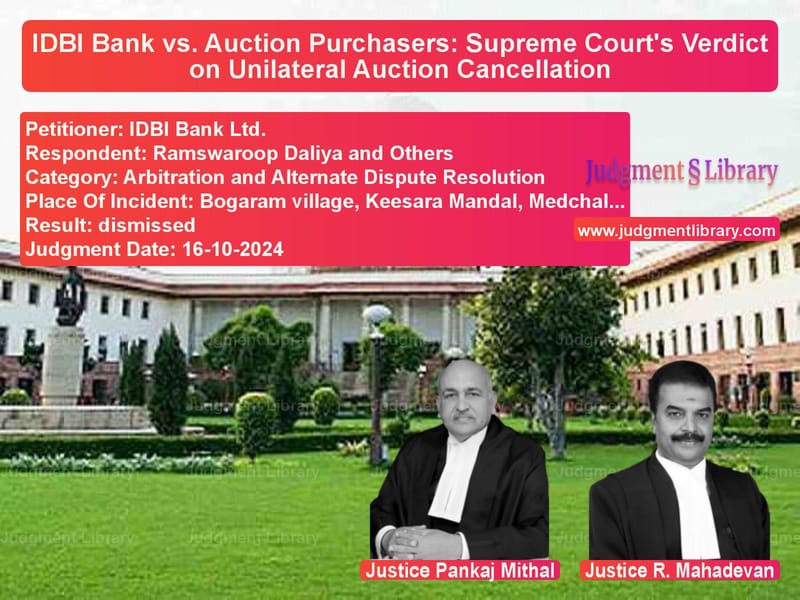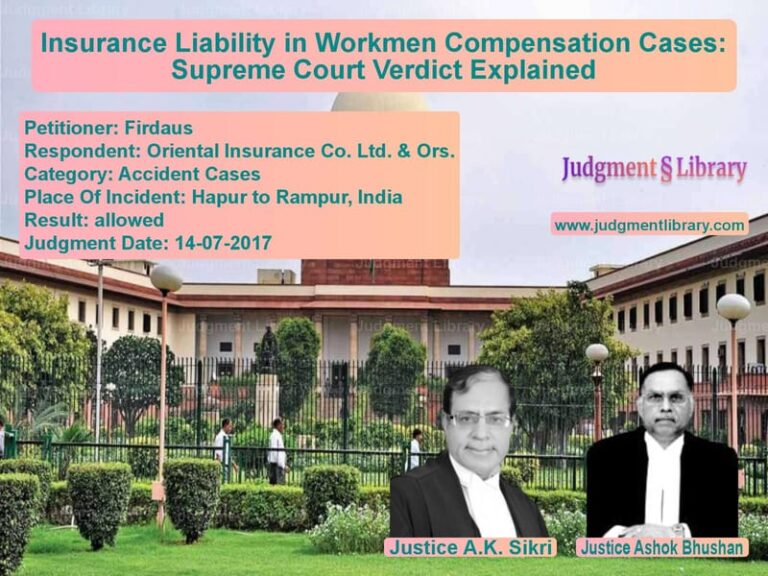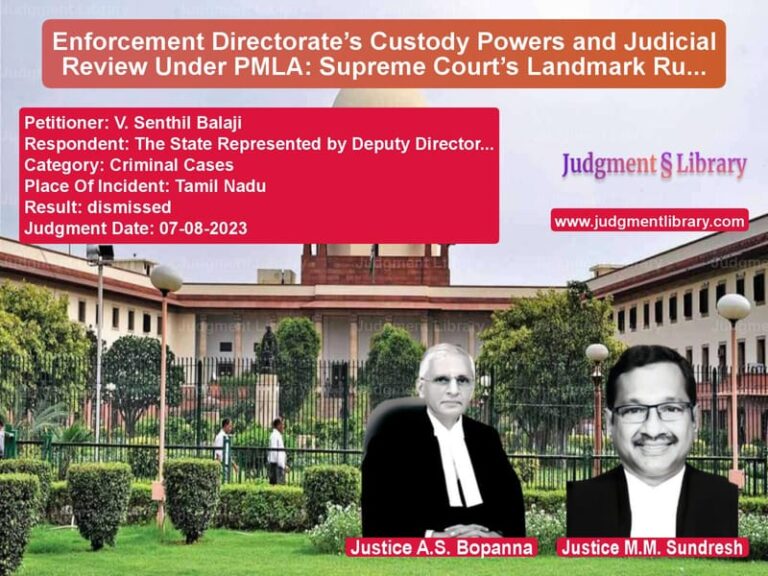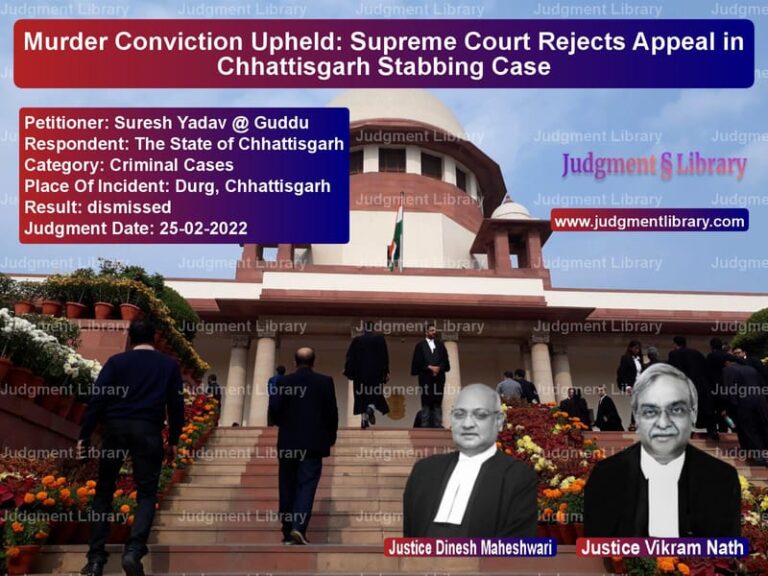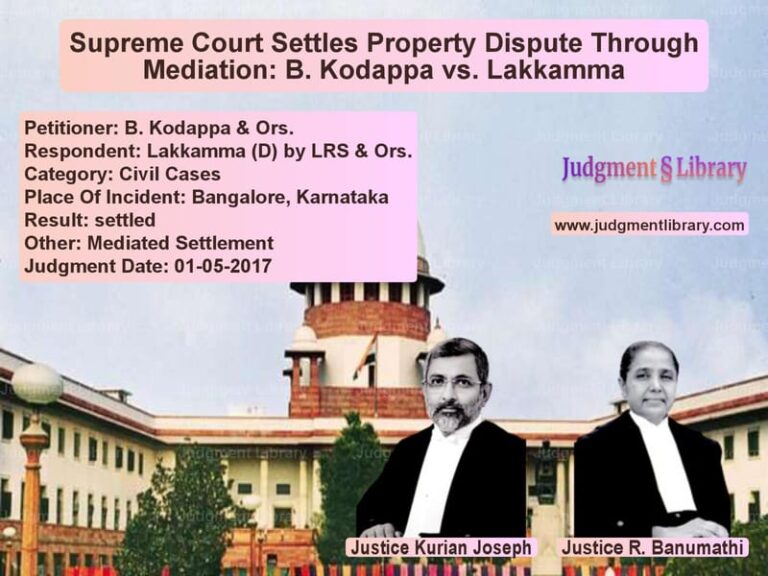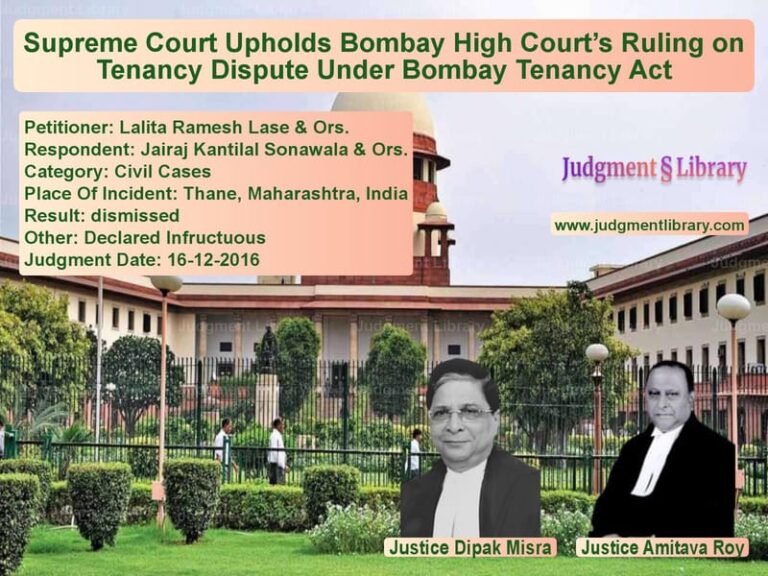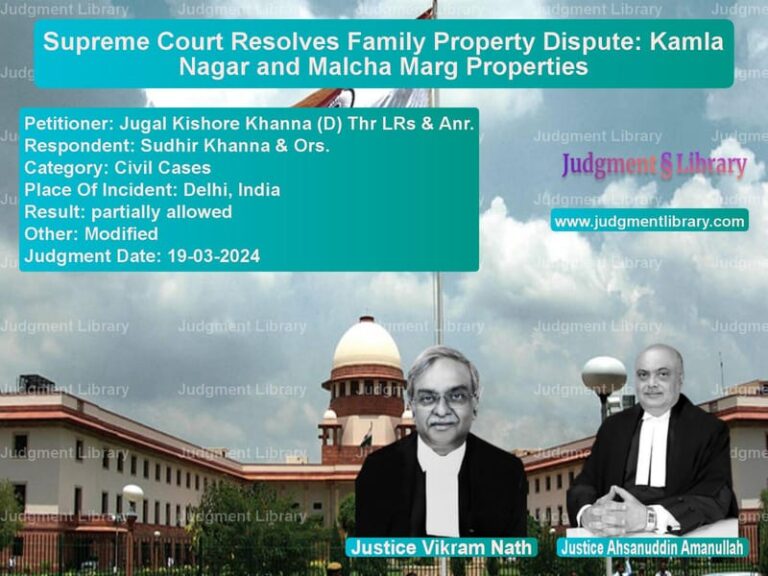IDBI Bank vs. Auction Purchasers: Supreme Court’s Verdict on Unilateral Auction Cancellation
The legal dispute between IDBI Bank Ltd. and auction purchasers regarding the cancellation of an auctioned property sale reached the Supreme Court, presenting key legal questions regarding the interpretation of the Security Interest (Enforcement) Rules, 2002, and the obligations of financial institutions under the law.
This case involved IDBI Bank Ltd., which conducted an auction sale of a property located in Bogaram village, Keesara Mandal, Medchal Malkajgiri district, Telangana. The respondents were the highest bidders in the e-auction held on April 10, 2018, for a total bid amount of Rs. 1,42,50,000/-. They deposited 25% of the bid amount, i.e., Rs. 36,00,000/-, on the same day. However, due to various reasons, IDBI Bank later refused to accept the balance sale consideration and unilaterally canceled the auction sale on December 24, 2019, refunding the deposited amount through demand drafts, which were never encashed by the respondents.
Aggrieved by the bank’s unilateral action, the respondents filed a writ petition before the High Court, which ruled in their favor. The bank challenged the High Court’s decision before the Supreme Court, arguing that the respondents had failed to comply with the mandatory payment deadlines under Rule 9(4) of the Security Interest (Enforcement) Rules, 2002.
Petitioner’s Arguments (IDBI Bank Ltd.)
The bank’s counsel contended that:
- Under Rule 9(4) of the Security Interest (Enforcement) Rules, 2002, the respondents were required to deposit the balance sale consideration within 90 days of the auction. Since they failed to do so, the bank had the legal right to cancel the auction.
- The bank had lodged a complaint with the Central Bureau of Investigation (CBI) on March 8, 2018, and the Enforcement Directorate (ED) had subsequently issued an advisory instructing the bank not to release the title deeds of the property.
- The respondents’ repeated requests for an extension to deposit the balance amount without making actual payments indicated a lack of genuine interest in completing the transaction.
- A writ petition challenging the auction sale had been filed by a guarantor, and an interim stay order had been passed by the High Court on April 18, 2018. This created additional legal complications for the bank, justifying its decision to cancel the auction.
Respondents’ Arguments
The respondents (auction purchasers) countered these claims by asserting that:
- They were always willing and ready to pay the balance sale consideration of Rs. 1,06,50,000/- but were prevented from doing so by the bank’s refusal to accept the amount.
- The ED advisory only directed the bank to keep the title documents in safe custody and did not prohibit the issuance of the sale certificate or completion of the sale transaction.
- Their inability to deposit the balance amount was solely due to the bank’s reluctance to facilitate the transaction, and the respondents could not be penalized for delays caused by the bank.
- The interim stay granted in the writ petition filed by the guarantor was of no consequence to the auction purchasers as the sale had already been confirmed before the stay order was issued.
Supreme Court’s Observations
The Supreme Court examined the facts of the case and made the following observations:
- The bank had issued the e-auction notice on March 17, 2018, despite having already lodged a complaint with the CBI. The bank was fully aware of potential legal complications but still proceeded with the auction.
- The respondents had made an earnest deposit of 25% of the bid amount and were ready to deposit the remaining balance. However, the bank’s actions prevented them from doing so.
- The Court noted that under Rule 9(4), the payment period could be extended by mutual agreement. Since the bank had not immediately revoked the auction confirmation or outright rejected the respondents’ payment attempts, its silence effectively amounted to an implied extension.
- The cancellation of the auction sale without affording the respondents an opportunity to be heard was a clear violation of the principles of natural justice.
- The bank’s argument that the respondents had defaulted under Rule 9(4) was rejected, as the delay in payment was due to the bank’s refusal to accept the amount.
Key Legal Precedents Cited
The Court referred to previous rulings, including:
- Varimadugu Obi Reddy v. Sreenivasulu and Others (2023): Held that the payment period under Rule 9(4) is not sacrosanct and can be extended by mutual agreement.
- General Manager, Sri Siddeshwara Cooperative Bank Ltd. v. Ikbal (2013): Ruled that the time frame for payment under Rule 9(4) is flexible and can be modified if the parties agree.
- Mohinder Singh Gill v. Chief Election Commissioner (1978): Established that a party cannot supplement its reasoning for an action through subsequent affidavits.
Final Judgment
The Supreme Court upheld the High Court’s decision and ruled that IDBI Bank’s cancellation of the auction sale was unjustified. The Court directed the bank to:
- Issue the sale certificate to the respondents within four weeks.
- Execute the sale deed upon receiving the balance sale consideration.
- Abide by the original auction terms without imposing any additional conditions.
Conclusion: The Supreme Court’s ruling reinforces the principle that financial institutions must act in good faith and cannot unilaterally cancel confirmed auctions without valid reasons. The decision ensures that auction purchasers are not unfairly penalized due to the inaction or reluctance of banks in facilitating transactions.
Petitioner Name: IDBI Bank Ltd..Respondent Name: Ramswaroop Daliya and Others.Judgment By: Justice Pankaj Mithal, Justice R. Mahadevan.Place Of Incident: Bogaram village, Keesara Mandal, Medchal Malkajgiri district, Telangana.Judgment Date: 16-10-2024.
Don’t miss out on the full details! Download the complete judgment in PDF format below and gain valuable insights instantly!
Download Judgment: idbi-bank-ltd.-vs-ramswaroop-daliya-an-supreme-court-of-india-judgment-dated-16-10-2024.pdf
Directly Download Judgment: Directly download this Judgment
See all petitions in Arbitration Awards
See all petitions in Dispute Resolution Mechanisms
See all petitions in Institutional Arbitration
See all petitions in Settlement Agreements
See all petitions in Judgment by Pankaj Mithal
See all petitions in Judgment by R. Mahadevan
See all petitions in dismissed
See all petitions in supreme court of India judgments October 2024
See all petitions in 2024 judgments
See all posts in Arbitration and Alternate Dispute Resolution Category
See all allowed petitions in Arbitration and Alternate Dispute Resolution Category
See all Dismissed petitions in Arbitration and Alternate Dispute Resolution Category
See all partially allowed petitions in Arbitration and Alternate Dispute Resolution Category

